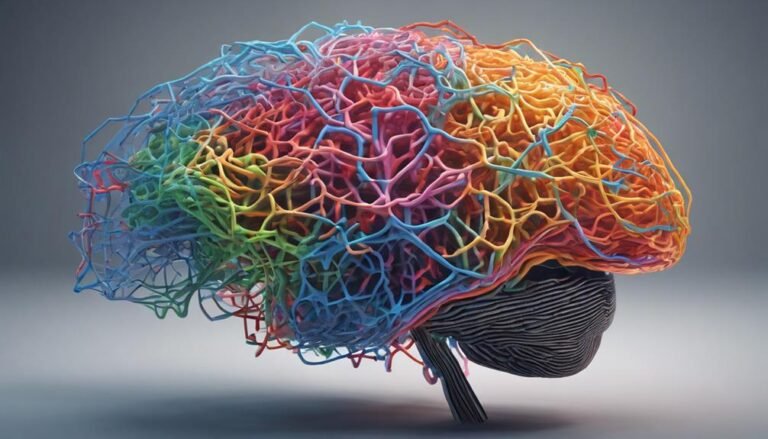Ethical Issues in the Use of Technology for Personality Assessment
When it comes to the ethical considerations surrounding the utilization of technology for personality assessment, there are various complexities that merit reflection. From safeguarding personal information to grappling with biases in algorithms, the landscape is multifaceted. Addressing these ethical dilemmas is not only vital for ensuring fairness and accuracy but also for upholding the integrity of such assessments. As you explore the intricacies of this topic, you'll discover the intricate interplay between technology, ethics, and human behavior that underscores the importance of thoughtful examination.
Key Takeaways
- Data privacy safeguards are crucial.
- Addressing bias and discrimination risks.
- Ensuring algorithm transparency.
- Managing informed consent challenges.
- Implementing cultural sensitivity measures.
Data Privacy and Security
Data privacy and security concerns play a significant role in the ethical considerations surrounding the use of technology for personality assessment. Ensuring data encryption is essential to protect sensitive information gathered during personality assessments. By implementing robust cybersecurity measures, organizations can safeguard against potential data breaches that may compromise individuals' personal data.
User control is another vital aspect when it comes to data privacy and security in personality assessment technology. Providing users with the ability to control their information, including what's collected and how it's used, enhances transparency and trust in the assessment process. This empowers individuals to make informed decisions about sharing their personal data for assessment purposes.
In light of the increasing prevalence of data breaches and cyber threats, prioritizing data privacy and security in technology for personality assessment is paramount. Organizations must continuously update their cybersecurity protocols to mitigate risks and protect the confidentiality of individuals' data throughout the assessment process.
Bias and Discrimination Risks
Considering the ethical implications of technology for personality assessment, it's essential to address the potential risks of bias and discrimination inherent in these tools. Unconscious biases, often embedded in the algorithms used for personality assessments, can lead to discriminatory outcomes. These biases can stem from historical data that reflect societal inequalities, perpetuating unfair treatment based on factors such as race, gender, or socioeconomic status.
The social implications of bias and discrimination in technology for personality assessment are profound. When individuals are unfairly judged or excluded due to algorithmic biases, it not only undermines the integrity of the assessment process but also reinforces existing societal prejudices. This can have far-reaching consequences, affecting employment opportunities, educational outcomes, and overall well-being.
To mitigate these risks, it's essential for developers and users of personality assessment technology to continuously monitor and address potential biases. By actively seeking out and rectifying discriminatory algorithms, we can work towards a more equitable and just system of personality assessment that upholds ethical standards and promotes fairness for all individuals.
Algorithm Transparency Concerns
To address algorithm transparency concerns in technology for personality assessment, a thorough evaluation of the underlying processes is essential. Vital transparency standards play a key role in ensuring that the algorithms used in personality assessment tools are understandable and accountable. Without clear transparency standards, there are ethical implications regarding how these algorithms may impact individuals' lives.
When transparency standards aren't met, it can lead to biases and discrimination risks in the personality assessment process. Individuals may not be aware of how their data is being used or what criteria the algorithms are based on, raising concerns about fairness and accuracy.
Informed Consent Challenges
When contemplating informed consent challenges in technology for personality assessment, you need to address the complexity of consent processes and the potential communication difficulties that may arise.
Understanding the intricacies of consent requirements and ensuring clear communication channels are crucial aspects to take into account in managing these challenges ethically and responsibly.
It's essential to prioritize transparency and clarity in obtaining informed consent to uphold ethical standards in utilizing technology for personality assessment.
Consent Complexity
Managing the complexities of consent in technology-driven personality assessment presents significant challenges that require careful consideration and thoughtful planning. When delving into the ethical considerations and legal implications surrounding consent in personality assessment, it's essential to make sure that individuals are fully informed about the purpose, risks, and benefits of the assessment.
Obtaining informed consent involves not only disclosing the nature of the assessment but also explaining how the technology will be utilized, the data collected, and how it will be safeguarded.
In the domain of personality assessment technology, where algorithms and artificial intelligence play a significant role, ensuring that individuals comprehend the intricacies of data processing and potential implications becomes paramount. Additionally, as technology continues to evolve rapidly, maintaining transparency about how data is used and shared is vital in upholding ethical standards and legal requirements.
Addressing the complexities of consent in technology-driven personality assessment demands a meticulous approach to tackle the multifaceted issues at hand.
Communication Concerns
Addressing communication concerns in technology-driven personality assessment involves ensuring individuals fully grasp the intricacies of data processing and potential implications, a task that demands precision and clarity. When it comes to communication in this scenario, several key points must be considered:
- Critical: Individuals should be clearly informed about how their data will be collected, processed, and used in personality assessment algorithms.
- Within this framework: Information provided should be easy to understand, avoiding technical jargon that may confuse or mislead individuals.
- Opportunity for Questions: Individuals should have the chance to ask questions and seek clarification on any aspects of the technology-driven assessment process.
- Consent Documentation: Clear records of individuals' consent to participate in personality assessment using technology should be maintained to address any ethical implications or trustworthiness concerns that may arise.
Ensuring effective communication in technology-driven personality assessment is essential for maintaining trust and upholding ethical standards in data processing and analysis.
Cultural Sensitivity Issues
When evaluating personality within different cultural contexts, it's essential to take into account how cultural norms can impact assessment outcomes.
Language barriers during testing may also pose challenges in accurately capturing an individual's personality traits.
Additionally, the diverse interpretations of personality traits across cultures highlight the importance of ensuring assessments are culturally sensitive and inclusive.
Cultural Norms Impact Assessment
Cultural norms greatly influence the process of evaluating personality traits through technology, necessitating careful consideration to guarantee cultural sensitivity in these evaluations. When evaluating personality across different cultures, it's essential to acknowledge the impact of cultural differences on evaluation accuracy.
Here are key points to take into account:
- Interpretation Variability: Cultural norms shape how individuals express traits, leading to variations in how responses are interpreted.
- Bias Awareness: Recognize potential biases in evaluation tools that may not accurately capture diverse cultural behaviors.
- Adaptation Strategies: Implement culturally sensitive evaluation methods to ensure accurate personality evaluations across different cultural contexts.
- Consultation with Experts: Engage with cultural experts to enhance understanding of how specific cultural norms may influence personality evaluation outcomes.
Language Barriers in Testing
Overcoming language barriers in testing poses significant challenges when ensuring cultural sensitivity in personality assessments through technology. The accuracy of translation and the cultural adaptation of assessment tools are vital factors in addressing linguistic challenges and promoting cross-cultural interpretation.
Ensuring translation accuracy is imperative to maintain the integrity of personality assessments when language barriers exist. Utilizing professional translators who are proficient in both languages being used in the assessment can help mitigate potential errors in translation that may impact the validity of the results.
Additionally, cultural adaptation of assessment tools involves more than just linguistic translation; it requires a deep understanding of the cultural nuances and context in which the assessment is being administered.
Linguistic challenges can arise from differences in language structures, idiomatic expressions, and cultural connotations, making it essential to take these factors into account when designing assessments for a diverse population. Cross-cultural interpretation involves interpreting responses within the cultural context of the individual, recognizing that meanings may vary across different cultural backgrounds.
Diversity in Interpretation
Addressing diversity in interpretation within personality assessments requires a nuanced understanding of cultural sensitivity issues. When it comes to interpreting assessment results across different cultural backgrounds, several challenges may arise due to cross-cultural differences. To navigate these complexities effectively, consider the following:
- Language nuances: Words or phrases may hold different meanings or connotations in various cultures, impacting how individuals respond to assessment items.
- Non-verbal communication: Interpretation of non-verbal cues such as body language or facial expressions can vary greatly across cultures, influencing assessment outcomes.
- Social norms and values: Cultural norms regarding self-expression, individualism, or collectivism can affect how individuals perceive and respond to personality assessment questions.
- Response styles: Cultural differences in response styles, such as acquiescence (tendency to agree) or extreme responding, can lead to misinterpretation of personality traits if not accounted for in the assessment process.
Understanding these interpretation challenges and cross-cultural differences is essential for ensuring the validity and reliability of personality assessments across diverse populations.
Accountability and Oversight
Promoting transparency and accountability in the use of technology for personality assessment is essential to uphold ethical standards and protect individual rights. To achieve this, organizations must prioritize regulatory compliance and adhere to strict ethical guidelines. Implementing oversight mechanisms can help prevent potential misuse of technology and ensure that assessments are conducted ethically and responsibly.
| Oversight Mechanism | Description | Importance |
|---|---|---|
| Regular Audits | Conducting periodic audits to review the technology used for personality assessments and ensure compliance with regulations and ethical standards. | Regular audits help identify any discrepancies or issues early on, promoting accountability and transparency. |
| Independent Review Boards | Establishing independent review boards to evaluate the ethical implications of using technology for personality assessment and provide guidance on best practices. | Independent review boards offer an external perspective to ensure that assessments are conducted ethically and in line with individual rights. |
| Transparent Reporting | Providing transparent reports on the methods and outcomes of personality assessments conducted using technology to maintain accountability and trust with stakeholders. | Transparent reporting fosters trust and allows for scrutiny, promoting ethical practices and accountability. |
Impact on Human Interaction
Understanding how technology impacts human interaction is essential in evaluating the ethical implications of using technology for personality assessment. When considering the impact on human interaction, it's imperative to explore how technology influences emotional intelligence and social dynamics:
- Emotional Intelligence: Technology can hinder the development of emotional intelligence by reducing face-to-face interactions, which are essential for understanding emotions and non-verbal cues.
- Social Dynamics: The use of technology for personality assessment may alter social dynamics by promoting online interactions over in-person connections, potentially leading to a lack of empathy and understanding.
- Communication Styles: Technology can shape individuals' communication styles, affecting how they express themselves and interpret others' messages, which can impact interpersonal relationships.
- Privacy Concerns: The reliance on technology for personality assessment raises privacy concerns as personal data shared online may be vulnerable to misuse, affecting trust in human interactions.
Considering these factors is crucial in ensuring that the integration of technology in personality assessment doesn't compromise the quality of human interaction and relationships.
Conclusion
As you reflect on the ethical implications of technology in personality assessment, consider this statistic: studies have shown that up to 70% of individuals are concerned about the privacy of their personal data when using online assessment tools.
This alarming figure underscores the importance of addressing data privacy and security issues to uphold the trust and confidence of users in the digital assessment process.
It's imperative to prioritize ethical considerations in the development and implementation of technology-driven assessments to safeguard individual rights and well-being.







